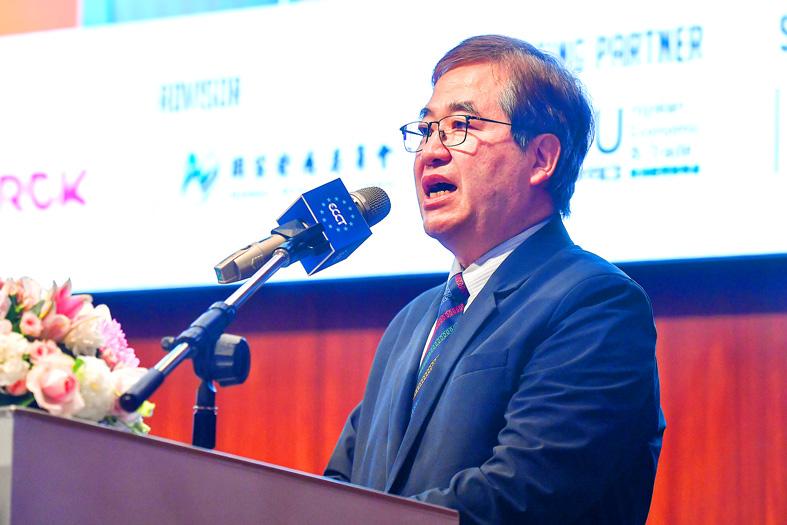The National Development Council (NDC) on Monday approved an investment of NT$38.166 billion (US$1.37 billion) over five years to upgrade seven international commercial ports in Taiwan.
The plan — which was proposed by the Ministry of Transportation and Communications — is expected to create 13,000 jobs and stimulate NT$320 billion in investment, NDC Deputy Minister Yu Chien-hwa (游建華) said.
The ministry is to launch 29 projects at the ports of Kaohsiung, Keelung, Hualien, Taichung and Taipei, as well as Tainan’s Anping and Yilan County’s Suao ports, to boost capacity, and turn them into green and smart international harbors, Yu said, citing the plan, which is to run from next year to 2026.

Photo: CNA
THROUGHPUT
Taiwan International Ports Corp (台灣港務) vice president of engineering Wang Chin-jung (王錦榮) said that the company aims to boost the total container throughput of the seven ports to 15.66 million to 18.22 million twenty-foot equivalent units (TEUs) by 2026.
It also hopes to increase total cargo throughput at the seven ports from an annual average of 1.59 billion tonnes at present to 1.80 billion tonnes by 2026, Wang said.
The ports would be developed and promoted based on their special characteristics, he said.
KAOHSIUNG EXAMPLE
For example, the Port of Kaohsiung is Taiwan’s largest port and was the 16th-busiest container port in the world last year, so Taiwan International Ports would make it a leading cargo transshipment hub in the Asia-Pacific region, Wang said.
The company hopes to increase the port’s container throughput from 9.62 million TEUs last year to 11.44 million TEUs by 2026, he said.
The Port of Taipei is to become a smart logistics center for automobiles and the Port of Taichung a base for green energy development, while the ports at Suao, Hualien and Anping are to be developed for tourism, Wang said.
Meanwhile, the Maritime Port Bureau plans to inject NT$9.7 billion into 33 projects to refurbish four domestic commercial ports — Budai in Chiayi County, Penghu, Kinmen and Matsu — to improve their competitiveness, and boost tourism and economic development near them.

CHIP RACE: Three years of overbroad export controls drove foreign competitors to pursue their own AI chips, and ‘cost US taxpayers billions of dollars,’ Nvidia said China has figured out the US strategy for allowing it to buy Nvidia Corp’s H200s and is rejecting the artificial intelligence (AI) chip in favor of domestically developed semiconductors, White House AI adviser David Sacks said, citing news reports. US President Donald Trump on Monday said that he would allow shipments of Nvidia’s H200 chips to China, part of an administration effort backed by Sacks to challenge Chinese tech champions such as Huawei Technologies Co (華為) by bringing US competition to their home market. On Friday, Sacks signaled that he was uncertain about whether that approach would work. “They’re rejecting our chips,” Sacks

Taiwan’s exports soared 56 percent year-on-year to an all-time high of US$64.05 billion last month, propelled by surging global demand for artificial intelligence (AI), high-performance computing and cloud service infrastructure, the Ministry of Finance said yesterday. Department of Statistics Director-General Beatrice Tsai (蔡美娜) called the figure an unexpected upside surprise, citing a wave of technology orders from overseas customers alongside the usual year-end shopping season for technology products. Growth is likely to remain strong this month, she said, projecting a 40 percent to 45 percent expansion on an annual basis. The outperformance could prompt the Directorate-General of Budget, Accounting and

NATIONAL SECURITY: Intel’s testing of ACM tools despite US government control ‘highlights egregious gaps in US technology protection policies,’ a former official said Chipmaker Intel Corp has tested chipmaking tools this year from a toolmaker with deep roots in China and two overseas units that were targeted by US sanctions, according to two sources with direct knowledge of the matter. Intel, which fended off calls for its CEO’s resignation from US President Donald Trump in August over his alleged ties to China, got the tools from ACM Research Inc, a Fremont, California-based producer of chipmaking equipment. Two of ACM’s units, based in Shanghai and South Korea, were among a number of firms barred last year from receiving US technology over claims they have

BARRIERS: Gudeng’s chairman said it was unlikely that the US could replicate Taiwan’s science parks in Arizona, given its strict immigration policies and cultural differences Gudeng Precision Industrial Co (家登), which supplies wafer pods to the world’s major semiconductor firms, yesterday said it is in no rush to set up production in the US due to high costs. The company supplies its customers through a warehouse in Arizona jointly operated by TSS Holdings Ltd (德鑫控股), a joint holding of Gudeng and 17 Taiwanese firms in the semiconductor supply chain, including specialty plastic compounds producer Nytex Composites Co (耐特) and automated material handling system supplier Symtek Automation Asia Co (迅得). While the company has long been exploring the feasibility of setting up production in the US to address